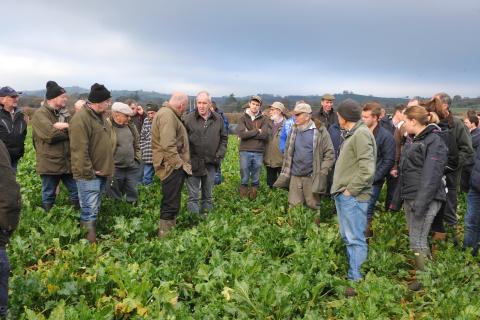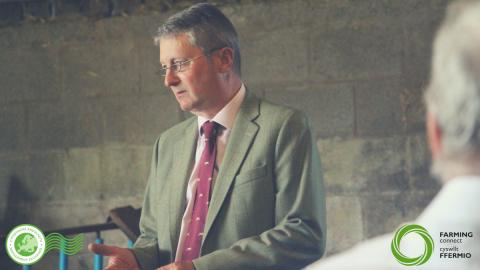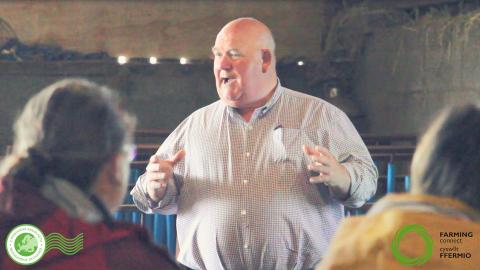1 June 2018
If you’re focused, ambitious and keen to broaden your horizons, it could be time to check your passport!
Farming Connect has begun its search for focused and ambitious farmers and foresters keen to enhance their business competitiveness and viability through participation in this year’s Management Exchange programme. The programme, now in its second year, will fund each participant up to a maximum of £4,000 for a study visit to Europe.
If you’re one of the fortunate few to be selected for this unique opportunity to view best practice at a farm or forestry enterprise of your choice in Europe, it might be soon be time to pack a suitcase!
“Last year’s successful participants had a fantastic opportunity to
see at first hand many different approaches to business management which broadened their knowledge, technical ability and management expertise,” says Einir Davies, development and mentoring manager with Menter a Busnes, which delivers Farming Connect.
“All that very valuable learning continues to be shared with the wider industry here in Wales through Farming Connect, which has resulted in many more farm businesses benefitting and adopting more efficient or profitable ways of working.
Farming Connect is funded by Welsh Government and the European Agricultural Fund for Rural Development.
“If you are an eligible individual, registered with Farming Connect
and believe you would benefit from an exchange visit to a farm or forestry business within the EU, and/or who would be interested in hosting a suitably trained and experienced farm or forest manager currently working in the EU at their home holding, we would urge you to apply as soon as possible,” said Ms. Davies. The window for applications is open from 31 May to 30 June 2018.
The aims of the programme are to enable both parties to identify developmental opportunities both at a personal and business level, and to facilitate the transfer and application of knowledge into innovative or advanced best practice which they can implement at home and share with the wider industry in Wales. Successful participants will be expected to disseminate findings from their learning experience through Farming Connect’s usual communications channels and events programme.
An independent judging panel will be responsible for the competitive selection process. All applicants will need to be available for interview on Monday 9 July or Tuesday 10 July 2018 in Aberystwyth. The names of those selected will be announced at an official ceremony at the Royal Welsh Show at Llanelwedd on Monday, 23 July 2018. Successful applicants will then either undertake or host a visit for a period of up to approximately six weeks. Two-way exchange visits will be encouraged but are not essential.
The funding rate for the programme is 100%, up to a maximum of £4,000 with costs reclaimed following the visit or hosting period.
For more detailed information on the benefits of the Farming Connect Management Exchange programme, Terms & Conditions, eligibility criteria and to download application forms click here.
Management Exchange case study – Richard Roderick, Newton Farm, Scethrog, Powys
Last year, Management Exchange candidate Richard Roderick who farms a 650 acre beef and sheep holding at Newton Farm near Brecon in partnership with his wife Helen, visited Scotland and the north of England to investigate profitable suckler cow production, based on the maximum utilisation of forage.
“Our aim over the next five years is to make the business more resilient for the changes which lie ahead. A sustainable business will mean producing lamb and beef, mainly from forage, to ensure that the cost base for the production is minimised.
“The hospitality shown and the information shared by the farms visited was overwhelming.
“Visiting other experienced farmers/producers was a huge a privilege and each time I learned something new or a new way of doing something.
“As a result of the visits, greater use of rotational grazing will be used at Newton Farm this summer and we will be recording and evaluating data in line with the new KPIs determined as a result of my exchange.”
Management Exchange case study – Hugh Brookes, Penlan Heritage Breeds, Cenarth, Carmarthenshire
Hugh Brookes who with his wife Katharine, breeds Mangalitza pigs at their hill-top farm in
Carmarthenshire, took his research into pig nutrition a step further last year with support from Farming Connect’s Management Exchange programme.
Through their role within the Farming Connect demonstration network, the couple had already accessed advice from an internationally renowned pig nutritionist who formulated a diet that included by-products sourced locally from well-known suppliers, including whey from Caws Cenarth; brewers’ grains from the Mantle Brewery and locally-grown potatoes that don’t quite make the grade for the market.
“It proved a very successful diet that matched our system while also enabling us to improve profitability, performance and reduce greenhouse gas emissions, but I was keen to learn about different aspects of pig management from other speciality breeders.”
One of 11 successful applicants in 2017, Hugh visited a leading breeder of Manglitza pigs in Arche De Wiskentale, Austria, where he learned about selective breeding, nutrition, rearing and butchery.
“My study visit proved invaluable, and we are now implementing what I learned, having designed and set up a new paddock system and constructed pig arcs.”
With their pork on the menu at some of London’s top restaurants, cooked by world renowned chefs, the couple’s appetite for learning – and speciality pork – has clearly paid off.
Management Exchange case study – Robb Merchant, White Castle Vineyard, Abergavenny
Robb Merchant and his wife purchased a 12 acre smallholding near Abergavenny in 1993, adding a further five acres in 2008. Although their main employment was outside agriculture, Robb’s early background was spent farming, which he says was a useful background for planting up White Castle Vineyard in 2009.
With support from Farming Connect’s Management Exchange programme, Robb was able to visit successful smaller vineyards in France’s Loire region.
“I learned about the wider considerations of not just first-class viticulture and its complex cost management considerations but winemaking and blending on a small scale within a specific geographical region.”
Robb saw at first-hand how French producers maintain and increase the quality of their grapes and wines with a strong focus on soil balance and health. He was also able to compare the business models of small wineries operating independently as opposed to within a co-operative, saying that the latter still allows producers to maintain their own brand.
His exchange began with a visit to the Loire Wine Show, a trade event which introduced him to numerous industry experts including growers, wine journalists and wine buyers before he began his tour of both vineyards and wineries.



